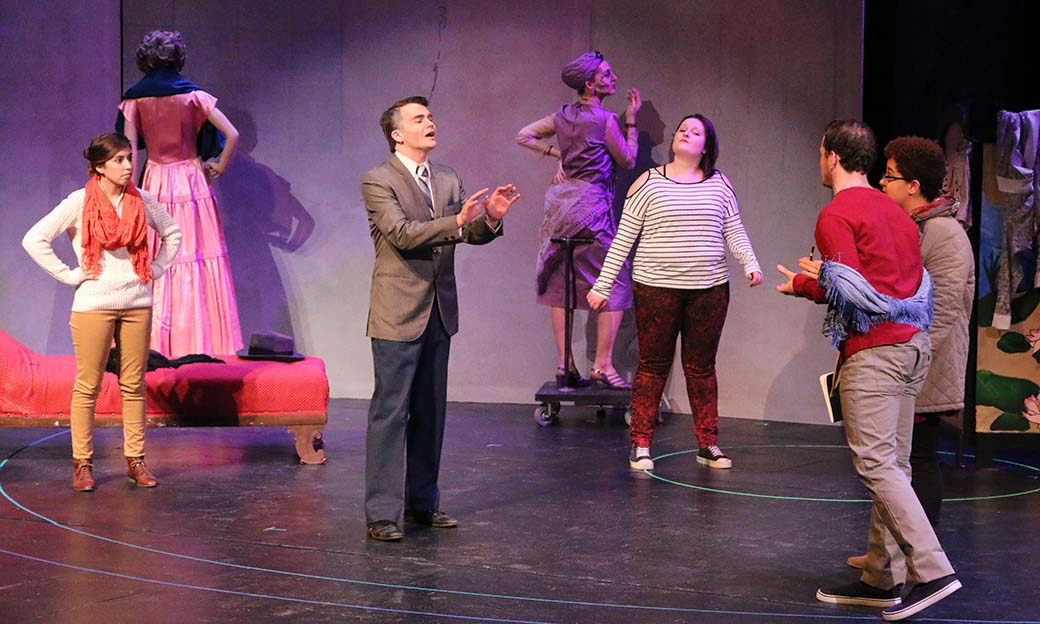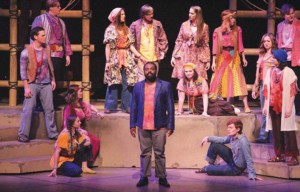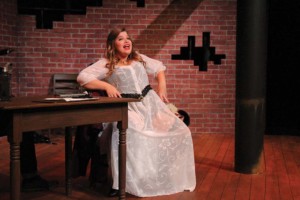
In and out of the spotlight
Lights, camera, action. There’s a lot more that goes into a production than many audience members realize. And there’s even more work that goes into being a full-time student and actor, which often means taking anywhere between 15 to 22 credit hours a semester and rehearsing 20 to 30 hours a week.

Senior musical theater majors Christa Gesicki and Ebrin Stanley talked about all the work that goes into being a musical theater student.
A typical day begins early and most students don’t leave the Warren M. Lee Center for Fine Arts until late at night, Stanley said.
“Most of us start (classes) at 9:30 at the earliest and so you go until about 5. You take a break, you have rehearsals from about 6 to 6:30 to 10… Then after that whatever’s open you find time to rehearse,” he said. “So on average some of us are here till almost 1 in the morning.”
Gesicki said there are a few strategies students use to complete all their work with such
busy schedules.
“But with these breaks (between classes and rehearsals), like yesterday I did all my homework before rehearsal. Even with all our performance classes we still have written stuff too. So really it’s whenever you have time,” she said. “Whether that’s waking up earlier in the morning and getting it done before you go to class or those small breaks or you just stay up really late and get it done.”
While life gets busy Stanley said students need figure out how to make things work best for them.
“You just kind of make it work,” Stanley said. “My adrenaline just keeps running.”
Gesicki’s time management has improved throughout her years at USD, she said.

“When we were freshman we used to stay up until like four or five in the morning and then go to our nine o’clock classes. I don’t know how we did it,” Gesicki said.
Gesicki said she saw a shift in her time management between her sophomore and junior year.
“It was one of those things we just had to learn as we went, because when your body crashes, you will know,” he said.
Not only do theater students have to worry about attending rehearsals and getting all of their homework done, but they also have to be healthy. The actors said health becomes more of a concern when they’re putting on shows.
“We’re doing something where we can’t be sick.” Gesicki said. “You can go to your lecture class when you lost your voice and still be fine, but if I’m going to an acting class and have to do my scene that day and don’t have a voice, we can’t do that.”
In Stanley and Gesicki’s time at USD, shows have gone from one to two weekend runs.

“When we did ‘Seussical,’ we did 13 shows and a couple of those days were two-a-day,” Gesicki said.
Stanley said during the longer runs, students need to listen to and trust their bodies.
“Like my body knows when I needed to just keep going, eventually it’ll crash, but it knows I need you to just hang in there a couple more weeks,” he said.
While Stanley and Gesicki have the routine down, first-year musical theater major Ella Williams is still learning how to balance her schoolwork and rehearsals.
“It’s pretty hard to manage,” she said. “It’s just learning that you need to do your homework before, because I’m not going to want to do it after rehearsing. Even in productions there are other smaller things to rehearse.”
Williams said the biggest adjustment since coming to USD was learning to function with little sleep.
“My first semester of college was a big switch because I am someone that likes to sleep a lot,” she said. “When I was in high school I would get a good eight plus hours of sleep. But learning like six hours of sleep is more normal and eight hours is like, exciting.”
While the work is exhausting, Williams said she wouldn’t trade it for anything.
“I’m learning a lot. I’m excited to be a part of so many productions my first year,” she said. “I’m very blessed to have these experiences.”
Gesicki said she has no doubt all the current underclassmen will get the major figured out.
“(I would tell them to) have lots of fun, it goes very very fast and as challenging as it can be, it can be equally rewarding if you let it be. So be open to that,” Gesicki said.
Stanley offered two pieces of advice to the underclassman.
“Stay true to you and with that stay in your own lane, and I don’t mean that in a rude way,” he said. “I mean that, in this profession, it’s so easy to focus on what he’s doing what she’s doing, they sound better than me, they look better than me. But the only person who can beat you is you.”

